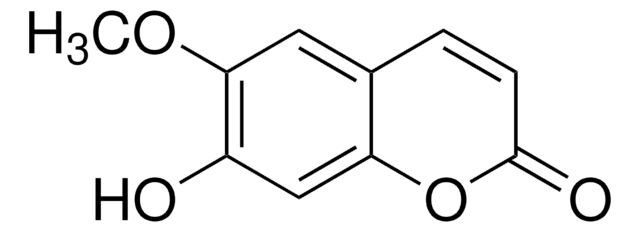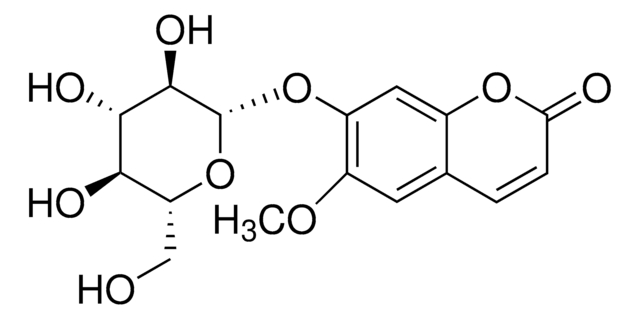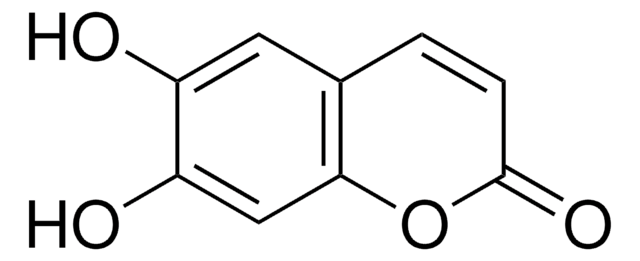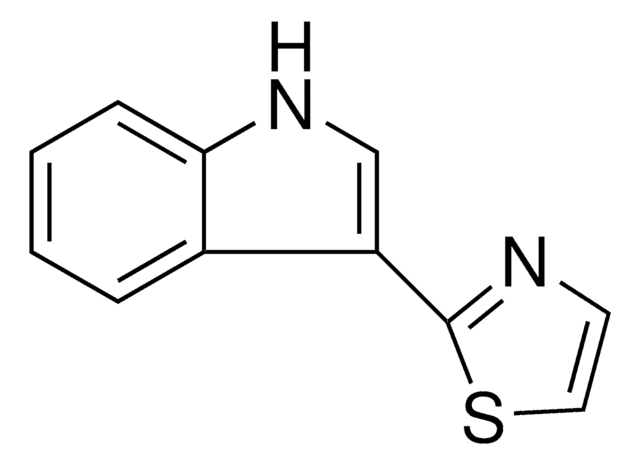38332
Scopoletin
analytical standard
Synonym(s):
6-Methoxyumbelliferone, 6-Methylesculetin, 7-Hydroxy-6-methoxy-2H-1-benzopyran-2-one, 7-Hydroxy-6-methoxycoumarin, Buxuletin, Chrysatropic acid, Escopoletin, Esculetin-6-methyl ether, Gelseminic acid, Murrayetin
About This Item
Recommended Products
grade
analytical standard
Quality Level
Assay
≥97.0% (HPLC)
shelf life
limited shelf life, expiry date on the label
technique(s)
HPLC: suitable
gas chromatography (GC): suitable
mp
203-205 °C (lit.)
application(s)
food and beverages
format
neat
storage temp.
2-8°C
SMILES string
COc1cc2C=CC(=O)Oc2cc1O
InChI
1S/C10H8O4/c1-13-9-4-6-2-3-10(12)14-8(6)5-7(9)11/h2-5,11H,1H3
InChI key
RODXRVNMMDRFIK-UHFFFAOYSA-N
Looking for similar products? Visit Product Comparison Guide
General description
Application
- Roots, stems, branches, and seeds as well as leaves of Chimonanthus nitens Oliv. by ultra-high performance liquid chromatography/tandem quadrupole-time-of-flight mass spectrometry (UHPLC-QTOF-MS/MS) equipped with modified mass deflect filter or diagnostic product ions/neutral loss filter.
- Canscora decussate (South Indian Shankhpushpi) extracts by high performance thin layer chromatography (HPTLC).
- Morinda tinctoria Roxb. leaf by HPTLC in conjunction with HPLC and gas chromatography with MS.
Biochem/physiol Actions
Packaging
Other Notes
Storage Class Code
11 - Combustible Solids
WGK
WGK 2
Flash Point(F)
Not applicable
Flash Point(C)
Not applicable
Choose from one of the most recent versions:
Already Own This Product?
Find documentation for the products that you have recently purchased in the Document Library.
Customers Also Viewed
Protocols
HPTLC fingerprinting enables rapid identification of passion flower with related reference materials.
HPTLC fingerprinting enables rapid identification of passion flower with related reference materials.
HPTLC fingerprinting enables rapid identification of passion flower with related reference materials.
HPTLC fingerprinting enables rapid identification of passion flower with related reference materials.
Our team of scientists has experience in all areas of research including Life Science, Material Science, Chemical Synthesis, Chromatography, Analytical and many others.
Contact Technical Service










